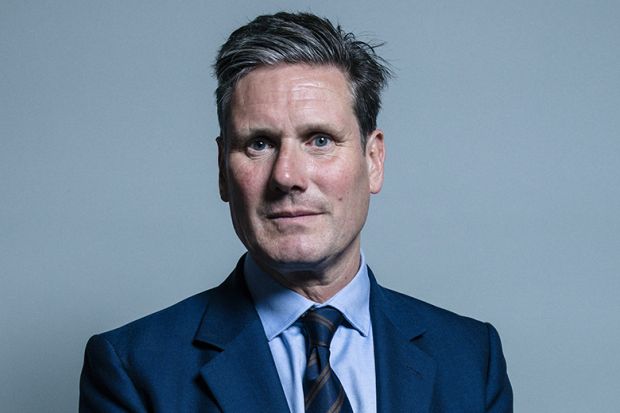The University and College Union said that Labour leader Sir Keir Starmer should be “backing staff, not bosses”, after he urged academics taking part in the UK’s assessment boycott to mark students’ work.
Thousands of students who are due to graduate this summer are expected to not get their final degree classifications due to industrial action tied to UCU’s long-running pay dispute with the Universities and Colleges Employers Association (Ucea).
Appearing on BBC Radio 4’s Today programme before he made a major speech on Labour’s education policy, Sir Keir was asked whether he would ask academics to mark papers so that students can graduate.
“I would,” Sir Keir replied. “I do feel very uncomfortable with this. I don’t want to tell them how to run their dispute, but I know how many of those young people will be feeling when they can’t get their paper marked, can’t get their degree or even going in some cases, I think, to graduation ceremonies where they’ll be handed a blank piece of paper.”
Pressed on whether he was saying “whatever the rights and wrongs of the dispute, that college lecturers should mark final papers in order that students can graduate”, Sir Keir replied: “I’m very uncomfortable that they don’t.”
Jo Grady, the UCU general secretary, said that Sir Keir had been “given an opportunity to show support for university staff engaged in industrial action but instead chose to undermine them”.
“UCU members are fighting for a sector that properly values staff, and we are proud to have the overwhelming support of students,” Dr Grady said. “The leader of the Labour Party should be backing staff, not bosses.
“He needs to recognise that the status quo in UK higher education is damaging and call on employer body Ucea to settle the dispute, not condemn staff fighting for the future of higher education.”
Ucea figures collected from 82 institutions at the end of last month estimated that around 13,000 students might not get their degrees as planned – 2.6 per cent of the cohort. Disruption varies significantly from institution to institution, with 40 per cent of respondents claiming there had been no impact on students and 11 per cent saying they had had more than 10 per cent affected.
UCU has suggested that Ucea’s data is an underestimate and that such figures did not account for the decline in academic standards that many universities have had to implement to mitigate the impact of the boycott.
Concern is mounting among sector leaders about the impact of the marking boycott, with Queen’s University Belfast last week becoming the first institution to settle the dispute locally. Several vice-chancellors have issued joint statements with union branches calling for pay negotiations to be restarted.
Dr Grady said that union members had been forced to take action “because successive governments have failed to properly fund higher education”.
“If Starmer is serious about supporting students, he needs to stop lecturing the staff that work so hard on their behalf, pledge to reform the funding model of higher education and immediately recommit to abolishing the toxic tuition fee system, which condemns millions to a lifetime of debt,” she said.

